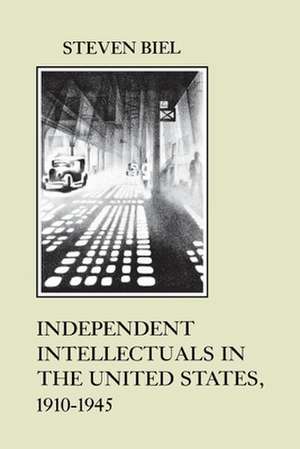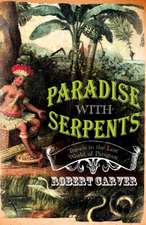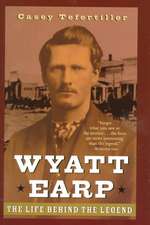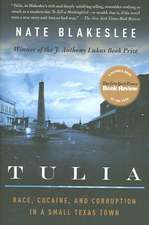Independent Intellectuals in the United States, 1910–1945: The American Social Experience
Autor Steven Bielen Limba Engleză Paperback – 31 ian 1995
Din seria The American Social Experience
-
 Preț: 241.08 lei
Preț: 241.08 lei -
 Preț: 239.51 lei
Preț: 239.51 lei -
 Preț: 240.49 lei
Preț: 240.49 lei -
 Preț: 225.71 lei
Preț: 225.71 lei -
 Preț: 244.90 lei
Preț: 244.90 lei -
 Preț: 245.49 lei
Preț: 245.49 lei -
 Preț: 242.92 lei
Preț: 242.92 lei -
 Preț: 210.32 lei
Preț: 210.32 lei -
 Preț: 227.62 lei
Preț: 227.62 lei -
 Preț: 245.49 lei
Preț: 245.49 lei -
 Preț: 240.27 lei
Preț: 240.27 lei -
 Preț: 242.22 lei
Preț: 242.22 lei -
 Preț: 253.55 lei
Preț: 253.55 lei -
 Preț: 243.19 lei
Preț: 243.19 lei -
 Preț: 243.58 lei
Preț: 243.58 lei -
 Preț: 242.40 lei
Preț: 242.40 lei -
 Preț: 226.67 lei
Preț: 226.67 lei -
 Preț: 247.23 lei
Preț: 247.23 lei -
 Preț: 225.49 lei
Preț: 225.49 lei -
 Preț: 226.67 lei
Preț: 226.67 lei
Preț: 241.64 lei
Nou
Puncte Express: 362
Preț estimativ în valută:
46.25€ • 48.10$ • 38.76£
46.25€ • 48.10$ • 38.76£
Carte tipărită la comandă
Livrare economică 14-28 martie
Preluare comenzi: 021 569.72.76
Specificații
ISBN-13: 9780814712320
ISBN-10: 0814712320
Pagini: 310
Dimensiuni: 152 x 229 x 15 mm
Greutate: 0.41 kg
Editura: MI – New York University
Seria The American Social Experience
ISBN-10: 0814712320
Pagini: 310
Dimensiuni: 152 x 229 x 15 mm
Greutate: 0.41 kg
Editura: MI – New York University
Seria The American Social Experience
Recenzii
"Each disaster gets its own chapter, which is not simply a straightforward account of 'what happened next'; contributors put each episode into context and question the popular 'lessons' that were often propagated immediately after. . . .Recommended"
Library Journal "We may be too close to September 11 to appreciate a study of the meanings of disaster; still, the attacks could spur interest in how Americans responded to past disasters. Biel, the director of studies in history and literature at Harvard, has assembled a provocative and illuminating collection."
Publishers Weekly"Biel (history and literature, Harvard; Down with the Old Canoe: A Cultural History of the Titanic Disaster) here considers 13 human-made and natural disasters, both famous and forgotten, that have occurred in American history, including the 1789 famine on the northern border, the San Francisco Earthquake, the Great Chicago Fire, and the Challenger disaster. Each disaster gets its own chapter, which is not simply a straightforward account of "what happened next"; contributors put each episode into context and question the popular "lessons" that were often propagated immediately after. Similar recent volumes include Ted Steinberg's Acts of God (LJ 9/1/00) and Dreadful Visitations, edited by Alessa Johns (Routledge, 2001). The important difference is that those books cover strictly natural disasters and as such only complement rather than substitute for this work. It is uncertain whether the publisher will use the terrorist attacks of September 11 as a touchstone for advertising this book, but the uncanny timing of its publication is hard to miss. Recommended for all libraries."
Library Journal "Brings to life, in a brisk and accessible format, a brilliant group of men and women who preferred to do good rather than well and left a rich legacy of creative thought."
American Historical Review "A textured history, one in which Biel's intellectuals emerge as serious, passionate, and very human workers grappling with the twin dragons of American materialism and self-identity."
American Literature "Biel's reappraisal contributes something new to our understanding of the significance of the intellectuals of the 1910s: their important role as antecedents for a succeeding generation of socially committed public intellectuals."
The Journal of American History "The kind of breakthrough that moves a field of scholarship to a new plateau."
Choice
"Each disaster gets its own chapter, which is not simply a straightforward account of 'what happened next'; contributors put each episode into context and question the popular 'lessons' that were often propagated immediately after...Recommended" --Library Journal "We may be too close to September 11 to appreciate a study of the meanings of disaster; still, the attacks could spur interest in how Americans responded to past disasters. Biel, the director of studies in history and literature at Harvard, has assembled a provocative and illuminating collection." --Publishers Weekly"Biel (history and literature, Harvard; Down with the Old Canoe: A Cultural History of the Titanic Disaster) here considers 13 human-made and natural disasters, both famous and forgotten, that have occurred in American history, including the 1789 famine on the northern border, the San Francisco Earthquake, the Great Chicago Fire, and the Challenger disaster. Each disaster gets its own chapter, which is not simply a straightforward account of "what happened next"; contributors put each episode into context and question the popular "lessons" that were often propagated immediately after. Similar recent volumes include Ted Steinberg's Acts of God (LJ 9/1/00) and Dreadful Visitations, edited by Alessa Johns (Routledge, 2001). The important difference is that those books cover strictly natural disasters and as such only complement rather than substitute for this work. It is uncertain whether the publisher will use the terrorist attacks of September 11 as a touchstone for advertising this book, but the uncanny timing of its publication is hard to miss. Recommended for all libraries." --Library Journal "Brings to life, in a brisk and accessible format, a brilliant group of men and women who preferred to do good rather than well and left a rich legacy of creative thought." --American Historical Review "A textured history, one in which Biel's intellectuals emerge as serious, passionate, and very human workers grappling with the twin dragons of American materialism and self-identity." --American Literature "Biel's reappraisal contributes something new to our understanding of the significance of the intellectuals of the 1910s: their important role as antecedents for a succeeding generation of socially committed public intellectuals." --The Journal of American History "The kind of breakthrough that moves a field of scholarship to a new plateau." --Choice
Library Journal "We may be too close to September 11 to appreciate a study of the meanings of disaster; still, the attacks could spur interest in how Americans responded to past disasters. Biel, the director of studies in history and literature at Harvard, has assembled a provocative and illuminating collection."
Publishers Weekly"Biel (history and literature, Harvard; Down with the Old Canoe: A Cultural History of the Titanic Disaster) here considers 13 human-made and natural disasters, both famous and forgotten, that have occurred in American history, including the 1789 famine on the northern border, the San Francisco Earthquake, the Great Chicago Fire, and the Challenger disaster. Each disaster gets its own chapter, which is not simply a straightforward account of "what happened next"; contributors put each episode into context and question the popular "lessons" that were often propagated immediately after. Similar recent volumes include Ted Steinberg's Acts of God (LJ 9/1/00) and Dreadful Visitations, edited by Alessa Johns (Routledge, 2001). The important difference is that those books cover strictly natural disasters and as such only complement rather than substitute for this work. It is uncertain whether the publisher will use the terrorist attacks of September 11 as a touchstone for advertising this book, but the uncanny timing of its publication is hard to miss. Recommended for all libraries."
Library Journal "Brings to life, in a brisk and accessible format, a brilliant group of men and women who preferred to do good rather than well and left a rich legacy of creative thought."
American Historical Review "A textured history, one in which Biel's intellectuals emerge as serious, passionate, and very human workers grappling with the twin dragons of American materialism and self-identity."
American Literature "Biel's reappraisal contributes something new to our understanding of the significance of the intellectuals of the 1910s: their important role as antecedents for a succeeding generation of socially committed public intellectuals."
The Journal of American History "The kind of breakthrough that moves a field of scholarship to a new plateau."
Choice
"Each disaster gets its own chapter, which is not simply a straightforward account of 'what happened next'; contributors put each episode into context and question the popular 'lessons' that were often propagated immediately after...Recommended" --Library Journal "We may be too close to September 11 to appreciate a study of the meanings of disaster; still, the attacks could spur interest in how Americans responded to past disasters. Biel, the director of studies in history and literature at Harvard, has assembled a provocative and illuminating collection." --Publishers Weekly"Biel (history and literature, Harvard; Down with the Old Canoe: A Cultural History of the Titanic Disaster) here considers 13 human-made and natural disasters, both famous and forgotten, that have occurred in American history, including the 1789 famine on the northern border, the San Francisco Earthquake, the Great Chicago Fire, and the Challenger disaster. Each disaster gets its own chapter, which is not simply a straightforward account of "what happened next"; contributors put each episode into context and question the popular "lessons" that were often propagated immediately after. Similar recent volumes include Ted Steinberg's Acts of God (LJ 9/1/00) and Dreadful Visitations, edited by Alessa Johns (Routledge, 2001). The important difference is that those books cover strictly natural disasters and as such only complement rather than substitute for this work. It is uncertain whether the publisher will use the terrorist attacks of September 11 as a touchstone for advertising this book, but the uncanny timing of its publication is hard to miss. Recommended for all libraries." --Library Journal "Brings to life, in a brisk and accessible format, a brilliant group of men and women who preferred to do good rather than well and left a rich legacy of creative thought." --American Historical Review "A textured history, one in which Biel's intellectuals emerge as serious, passionate, and very human workers grappling with the twin dragons of American materialism and self-identity." --American Literature "Biel's reappraisal contributes something new to our understanding of the significance of the intellectuals of the 1910s: their important role as antecedents for a succeeding generation of socially committed public intellectuals." --The Journal of American History "The kind of breakthrough that moves a field of scholarship to a new plateau." --Choice
Notă biografică
Steven Biel is Director of Studies in History and Literature at Harvard University, and the author of Down With the Old Canoe: A Cultural History of the Titanic Disaster.








